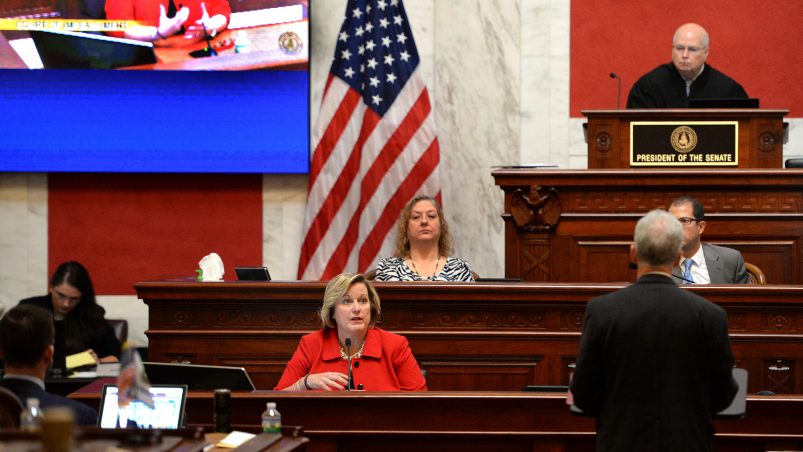CHARLESTON, W.Va. (AP) — West Virginia senators have voted to allow impeached Supreme Court Justice Beth Walker to remain in office.
The 32-1 vote Tuesday followed a two-day impeachment trial. One senator was absent. A two-thirds majority was required to remove Walker, whose 12-year term expires in 2028.
Walker was accused of abusing her authority. The charge stated that Walker and other justices failed to control office expenses and maintain policies over matters such as working lunches and the use of state vehicles and office computers at home.
The vote came after two hours of deliberations and exactly five weeks before the general election, when half of the Senate seats are at stake.
It also occurred the same day that jury selection began in federal court in Charleston in the trial of suspended Supreme Court Justice Allen Loughry. A 25-count indictment includes allegations that Loughry repeatedly lied about using his office for personal gain.
The House of Delegates in August impeached Loughry, Walker and justices Margaret Workman and Robin Davis. In addition to spending, the cases also raised questions about corruption, incompetence and neglect of duty earlier this decade.
Some Democrats have calling the impeachments a power grab by the Republican-led legislature, strategically timed so GOP Gov. Jim Justice could name U.S. Rep. Evan Jenkins and former House Speaker Tim Armstead to temporarily replace Ketchum and Davis while running for their spots on the bench. Jenkins and Armstead are among 20 total candidates seeking those seats in a Nov. 6 special election.
Judicial elections in West Virginia became nonpartisan in 2016. Walker is a Republican.
House judiciary committee chairman John Shott, the lead prosecutor in Walker’s Senate trial, urged senators in his closing arguments to sustain the impeachment article if they doubt that keeping her on the bench would help restore the public’s trust and confidence in the judicial branch of government.
Shott compared Walker asking for another chance to serve in office to a golfer who uses a “mulligan” after hitting a bad shot. He said Walker spent $131,000 to renovate her office despite tens of millions of dollars in budget cuts in the state’s public and higher education system.
“That’s why this reminds me of my golf game,” Shott said. “How many mulligans do you think the people that you represent think she deserves?”
The House previously chose not to impeach Walker for her office renovations, far less than what some other justices spent. Shott earlier had worked out a settlement agreement to have Walker’s impeachment charge dropped before the Senate rejected the offer last month.
Walker’s attorney, Mike Hissam, said in closing arguments that Walker joined the court in January 2017 and was “trying to learn the job. She was trying to right the ship. But she hasn’t done anything under the constitution that justifies her removal from office.”
Hissam noted that Walker supports a proposed constitutional amendment on the November ballot that would give the Legislature more budgetary control over the judiciary. Currently the Supreme Court sets and controls its own budget. Opponents of the proposed amendment say that would infringe on the courts’ independence.
In federal court, Loughry also is charged with making personal use of a state vehicle and credit card, and trying to influence an employee’s testimony and a federal grand jury investigation.
The indictment accuses him of “creating a false narrative” about an antique desk and leather couch that he had transferred from the Supreme Court offices to his home, and that he repeated the false narrative to an FBI special agent during a March interview.
Loughry, in consultation with the other justices, had constitutional autonomy in deciding how the system spends a $139 million annual budget. He was removed and suspended without pay earlier this year by the state’s high court.
Loughry has repeatedly denied involvement in renovations of his office, which cost $353,000 and included a $32,000 blue suede couch and a $7,500 wood-inlay floor map of West Virginia. He made one such denial to the House Committee on Finance in January. He blamed the spending on former court administrator Steve Canterbury, whom he fired in January 2017.
Loughry also had a $42,000 state-owned antique desk moved into his home. He returned the desk after news outlets asked about it.
Impeachment trials also are set later this month for Workman and Davis and next month for Loughry. Davis announced her retirement shortly after her impeachment, but the Senate also rejected a resolution that would have dropped charges against her.
A fifth justice, Menis Ketchum, resigned before the impeachment proceedings began.



